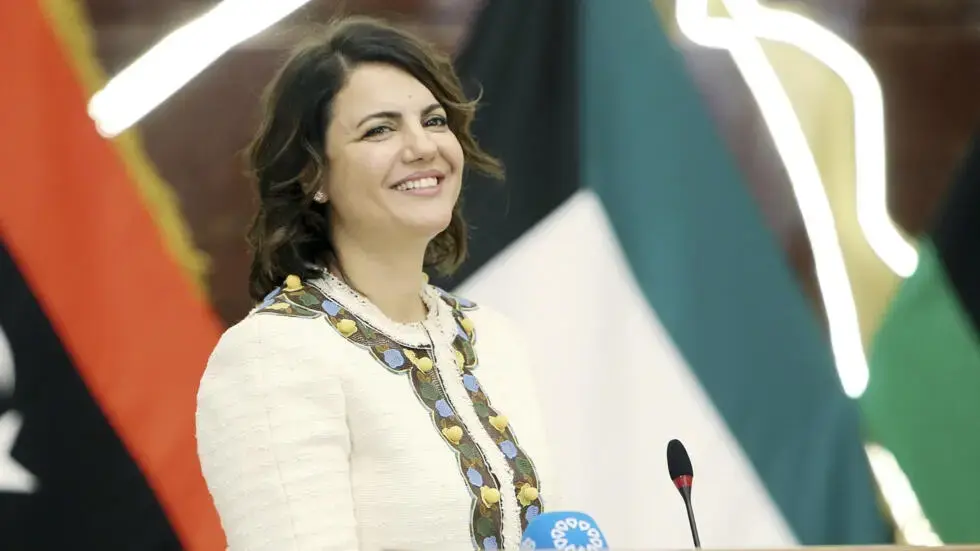Libyan foreign minister suspended over talks with Israeli counterpart
TRIPOLI

The leader of Libya's government said Sunday that he had suspended his foreign minister after her Israeli counterpart announced he had held talks with her last week in Rome.
Najla al-Mangoush has been "temporarily suspended" and will be subject to an "administrative investigation" by a commission chaired by the justice minister, Prime Minister Abdulhamid Dbeibah said on Sunday evening in an official decision posted on Facebook.
The Libyan foreign ministry described it as a "chance and unofficial encounter", but news of the meeting had already led to street protests in several Libyan cities.
The political row broke out Sunday after Israel's foreign ministry said the two countries' foreign ministers had met the previous week.
The statement said Israeli Foreign Minister Eli Cohen and Mangoush, his Libyan counterpart in the Tripoli-based administration, spoke at a meeting in Rome hosted by Italian Foreign Minister Antonio Tajani.
The Israeli statement described it as the first such diplomatic initiative between the two countries.
"I spoke with the foreign minister about the great potential for the two countries from their relations," Cohen said in the statement from Israel's foreign ministry.
But the Libyan foreign ministry said Sunday evening that Mangoush had "refused to meet with any party" representing Israel.
"What happened in Rome was a chance and unofficial encounter, during a meeting with his Italian counterpart, which did not involve any discussion, agreement or consultation," the ministry said in a statement.
The minister had reiterated "in a clear and unambiguous manner Libya's position regarding the Palestinian cause", the statement added.
News of the meeting had sparked protests in some Libyan cities and a letter from the country's Presidential Council requesting clarification.
The Libyan foreign ministry accused Israel of trying to "present this incident" as a "meeting or talks".
In the Israel foreign ministry statement, Cohen was quoted as saying that the two discussed "the importance of preserving the heritage of Libyan Jews, which includes renovating synagogues and Jewish cemeteries in the country".
"Libya's size and strategic location offer a huge opportunity for the State of Israel," he added.
There was no immediate confirmation of the meeting from Rome.
Earlier on Sunday evening, Libya's Presidential Council requested "clarifications" from the government, according to Libya al-Ahrar TV, citing correspondence from spokeswoman Najwa Wheba.
The Presidential Council, which has some executive powers and sprang from the UN-backed political process, includes three members representing the three Libyan provinces.
The letter said that this development "does not reflect the foreign policy of the Libyan state, does not represent the Libyan national constants and is considered a violation of Libyan laws which criminalise normalisation with the 'Zionist entity'".
It asked the head of government "to apply the law if the meeting took place".
On the streets of Tripoli and its suburbs, protests erupted Sunday evening in a sign of refusal of normalisation with Israel. The protests spread to other cities where young people blocked roads, burned tyres and waved the Palestinian flag.
Like several other North African countries, Libya has a rich Jewish heritage.
But during decades of rule by former Libyan leader Moamer Kadhafi, who was a strong supporter of the Palestinian cause, thousands of Jews were expelled from Libya and many synagogues were destroyed.
Kadhafi was overthrown and killed in 2011 by a NATO-backed uprising that plunged the country into more than a decade of chaos and lawlessness.
The country is split politically with rival administrations -- the Tripoli government in the west and another in the east backed by military strongman Khalifa Haftar.
Israel has normalised relations with some Arab countries in recent years as part of US-backed deals known as the Abraham Accords.
However, Prime Minister Benjamin Netanyahu's hardline government has come under intense criticism from Arab states because of surging violence in the West Bank and for backing the expansion of Jewish settlements in the occupied territory.
















